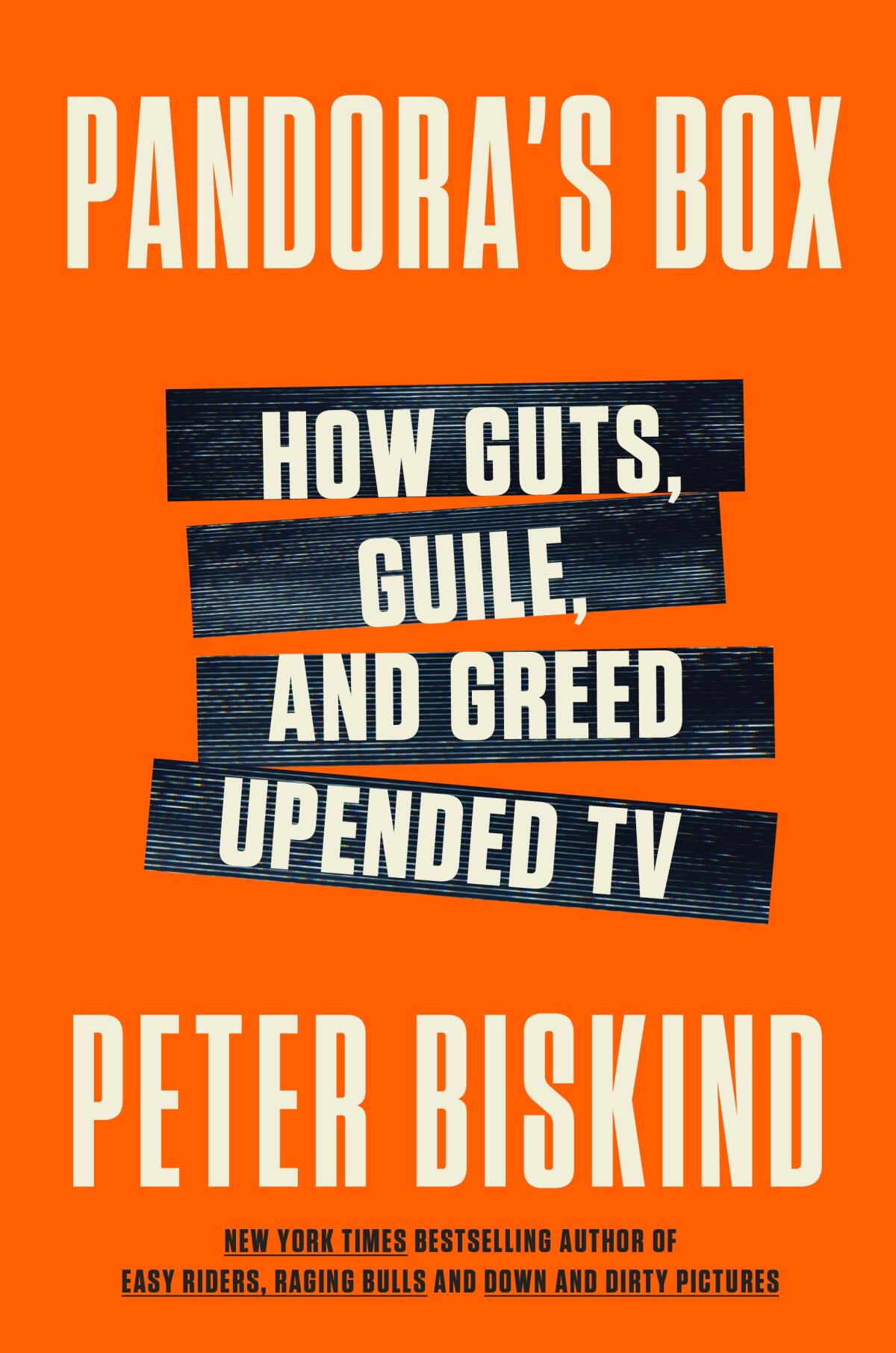Peter Biskind’s gossip-mongering history of TV is rarely illuminating, never boring

- Share via
Review
Pandora's Box: How Guts, Guile, and Greed Upended TV
By Peter Biskind
William Morrow: 400 pages, $33
If you buy books linked on our site, The Times may earn a commission from Bookshop.org, whose fees support independent bookstores.
Like a frenzied point guard trying to jack up his assist numbers, Peter Biskind needs to dish. A little innuendo over here. A caustic quote over there. And anonymous sources. Lots and lots of anonymous sources. More than once in “Pandora’s Box,” his sprinting overview of the 21st-century cable-and-streaming revolution, Biskind actually quotes other people’s anonymous sources (my favorite instance: “As someone or other told The New York Times’ Maureen Dowd …”). It often feels as if Biskind trusts people more when they don’t go on the record. His books, including the era-defining New Hollywood gossip-fest “Easy Riders, Raging Bulls” and the not-quite-exposé of Harvey Weinstein’s Miramax, “Down and Dirty Pictures,” play like gleefully competitive food fights among Hollywood’s power elite.
This can be great fun, even enlightening; “Easy Riders” in particular creates the sensation of grasping the big picture of a heavily mythologized time and place in pop culture. But Biskind can also get sloppy, and “Pandora’s Box” finds him at his sloppiest.
“Apropos of Nothing” is a mixed bag of rich memories, harsh defenses and tone-deaf reveries.
The writing feels rushed, with one sentence spilling into the next, sometimes with no regard for chronological accuracy: “‘The Wolf of Wall Street,’ written by Terry Winter, had been Scorsese’s biggest grosser, so the director called him in 2008 and asked if he’d be interested in helping him with ‘Vinyl.’” This is interesting, especially since “Wolf” came out in 2013.

References to “today’s woke culture” read like easy Fox News talking points. There’s a surplus of what might politely be called strained dad jokes. “It was time for Disney to wake up its sleeping beauty, that is, its library of classic animation, and what a beauty it was.” Or, on former HBO exec Michael Lombardo’s decision to turn down “Yellowstone”: “Given that the show became one of 2022’s biggest series, it would be fair to say that Lombardo was yellowstoned.” Thanks. Try the veal.
The late Roger Ebert, who once denied that an entire Biskind anecdote about him ever took place, claimed that “Biskind has a way of massaging his stories to suit his agenda.” One could argue that Biskind massages the very premise of “Pandora’s Box,” as when he claims that “the first golden age of live TV became a measureless tract of hard, cracked soil, inhospitable to intelligent life….” Really? We’re just going to ignore “Playhouse 90,” Kraft Television Theatre’s “Patterns” and any number of other high-water marks? Yes, we are, because it helps support the thesis that network television was always a vast wasteland until HBO gave us “Oz” (1997-2003) and “The Sopranos” (1999-2007).
The frustrating thing is that you know Biskind knows better. He’s just not terribly interested in any facts that get in the way of his central point. His is a journalism of convenience. In this sense he is perfect for the go-go online age he covers here.
How ‘Star,’ Peter Biskind’s biography of Warren Beatty, was born
And yet. Biskind is just about incapable of being boring, and “Pandora’s Box” skims along with snarky vigor. He has a talent for puncturing and petting egos at the same time, and if he depicts the executives featured here, including HBO’s Richard Plepler, Netflix’s Ted Sarandos, FX’s John Landgraf and Warner Bros. Discovery’s David Zaslav, as grown-up kids in a golden sandbox, it’s because that’s how they often seem to act. “Pandora’s Box” unfolds as a series of back-stabbings, full of dismissals that play out like spouses breaking up via text message. Biskind warms to the task of wrapping his arms around the trends and dead ends, the beefs and collaborations that have given this TV era its frisson.

These creatives and executives don’t come off as good people, so it’s a good thing they helped get so many good shows on the air. The depth and breadth of programming detailed here is staggering; a very partial list includes “The Sopranos,” “Mad Men,” “Game of Thrones,” “Breaking Bad,” “The Americans,” “Orange Is the New Black,” “The Shield,” “Transparent” and countless others. Biskind is at his best in this book as a critic and industry analyst rather than a reporter. “As the politics of power played out,” he writes, “it became clear that ‘Game of Thrones’ was the anti-’Lord of the Rings,’ [George R.R.] Martin the anti-Tolkien.”
But he also misses big things. He deals with “Yellowstone” summarily, without acknowledging that its workaholic creator, Taylor Sheridan, has become a game-changing industry unto himself. He dots his Netflix analysis with “Squid Game” references without ever really grappling with how that dystopian drama has opened a floodgate of South Korean programming. These are important pieces of the story Biskind is telling, and as we learned from “The Wire,” another series that gets short shrift here, all the pieces matter.
Graduating students chanted ‘Pay your writers!’ and booed David Zaslav during the studio head’s commencement speech at Boston University.
Finally, about those anonymous sources: Every reporter needs some. It’s how sensitive information often gets disseminated. Anonymous sources can be whistleblowers. But these aren’t whistleblowers. Most often they seem like tattlers — aggrieved, ego-mad parties eager to settle scores but not on the record (after all, they might have to work again with the people they so revile). One can imagine a drinking game in which readers of “Pandora’s Box” take a shot with every invocation of “a source,” “one agent,” “one of his colleagues who disliked him” or “one well-regarded rival executive who doesn’t want his name used.” And that old chestnut, “Rumor was.”
Biskind is a seasoned observer of how the showbiz sausage gets made. He’s also a hopeless gossip. In this sense, he may have found his perfect subjects.
Vognar is a freelance writer based in Houston.
More to Read
Sign up for our Book Club newsletter
Get the latest news, events and more from the Los Angeles Times Book Club, and help us get L.A. reading and talking.
You may occasionally receive promotional content from the Los Angeles Times.








